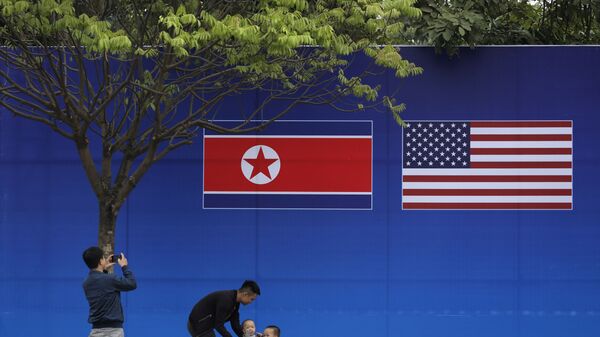North Korea has ceased working level nuclear talks with the United States, Yonhap News Agency reported, citing the DPRK’s chief negotiator Kim Myong Gil.
"We are disappointed that the United States did not put anything on the negotiation table. Now the United States has the responsibility to continue the negotiations", Kim Myong Gil stated as quoted by Dagens Nyheter.
He continued by saying that it depends on the US whether Pyongyang will continue to test-launch intercontinental ballistic missiles.
"We clearly expressed our position. The suspension of nuclear and intercontinental ballistic missile tests, the demolition of a nuclear test site in the north of the country, the return of the remains of US soldiers — we were the first to take steps to denuclearise and build confidence, if the United States sincerely responds to this, then we can move on to the next stage, of a serious discussion of denuclearisation measures", Kim said.
A day earlier, Time Magazine reported, citing sources in the White House, that US President Donald Trump was ready to offer North Korean leader Kim Jong-un a suspension of UN sanctions on textile and coal exports if Pyongyang would agree to dismantle the key nuclear facility at Yongbyon and stop the production of highly enriched uranium.
State Department spokeswoman stated later that the comments by North Korea do not reflect the content or spirit of more than eight hours of talks in Sweden.
According to Saurav Jha, an energy and security expert as well as editor-in-chief of the Delhi Defence Review, the US insistence on certain verifiable steps by the North Korean side in terms of restraint on the testing and development of delivery vectors is probably the main obstacle to the talks on nuclear disarmament. According to the specialist, the US likely wants initial confidence building measures (CBMs) from North Korea, which it does not want to give for whatever is currently being offered in exchange.
"Frankly, it is difficult to see North Korea giving up its main bargaining chip altogether. Most likely, its approach would be to offer verifiable restraint in return for economic sops. I don't think the US can abandon its old approach either. There will be give and take", Jha argues.
South Korean President Moon Jae-in said in late September that North Korea and the United States were preparing to relaunch denuclearisation talks after they collapsed in February following an unsuccessful leaders' summit.
In late June, Trump and Kim met at the Korean Demilitarised Zone. Then, they agreed to re-energise the stalled denuclearisation dialogue and initiate working-level contacts.
US-North Korea talks on the denuclearisation of the Korean Peninsula stalled in February following an unsuccessful summit between the two countries' leaders.
The situation on the Korean Peninsula significantly improved last year after North Korean leader Kim Jong-un's talks with South Korean President Moon Jae-in and US President Donald Trump. In June 2018, Kim and Trump reached an agreement stipulating that North Korea would make efforts to promote the complete denuclearisation of the peninsula in exchange for the freezing of US-South Korean military drills and the potential removal of US sanctions.


